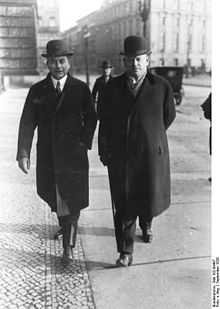Julius Curtius
Julius Curtius (7 February 1877, Duisburg – 10 November 1948, Heidelberg) was Foreign Minister of Germany from October, 1929 to October 1931. Curtius was a member of the national-liberal German People's Party and worked closely with Heinrich Brüning to revise the Treaty of Versailles in Germany's favor. However, Curtius was not a member of Brüning's inner circle. His notable achievement as Foreign Minister was in negotiating a customs union with Austria in March 1931, but opposition from France scuttled the proposed union. To halt the union, the French withdrew a number of short loans they had made to Austria; the withdrawal of the French loans helped to cause the collapse of Austria's largest bank in May, 1931, which in its turn set a series of banking collapses all over Central Europe in the summer of 1931. Curtius was intimately involved in the negotiations that led to the issuing of the Hoover Moratorium by the U.S President Herbert Hoover that halted war reparations payments by Germany in June 1931 as part of the effort to limit the financial fall-out of the banking collapse.
His dismissal as foreign minister was largely brought about by pressure from General Kurt von Schleicher and President Paul von Hindenburg. A somewhat mediocre man, Curtius' appointment was due more to the memory of his predecessor, Gustav Stresemann, and of the German People's Party, than to his own abilities.
The Second Müller Cabinet |
|---|
| | |
|

.svg.png)